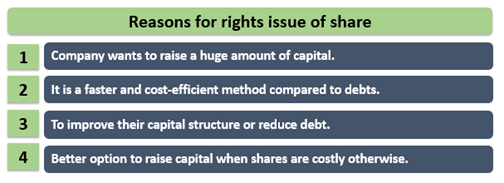Definition
Related Definitions
Rights Issues
What is a rights issue?
A 'rights issue' is a share offer made to existing shareholders by a company making them eligible for new shares at a pre-fixed ratio of their current holdings. The new shares offered are usually available at a discounted price compared to their current market value. Rights are often 'Renounceable Rights', meaning shareholders can trade them right after allocation to the shareholder. A rights issue is a company's way of compensating existing shareholders in a new share offer. However, a rights issue leads to share dilution.
Highlights
- A rights issue is a share offering to existing shareholders, allowing them to buy new shares at a discounted value.
- Shares are offered under the right issue proportion to existing shareholding and are valid until a pre-fixed date.
- The right issue only grants shareholders the right to buy shares at discounted prices; it is not an obligation.
Frequently Asked Questions (FAQ)-
How does a rights issue work?
Shares are issued to the existing shareholders in ratio to their existing holdings in the company. Those eligible have an option to subscribe fully or partly to the rights issue. Shareholders may also opt to let the offer lapse or may transfer their rights entitlements. Trading rights entitlements on a stock exchange to transfer them is known as 'renunciation of rights issue'. Let's explore what happens when a shareholder chooses one of the three options on a rights issue.

Source: © Nik93737 | Megapixl.com
- If the entire right to purchase is taken up-
The shareholder gets to purchase the proportion of shares offered at a discounted price. However, the value of each share held gets diluted due to a rise in the company's capital base. In theory, due to the introduction of new shares at deep discounts, existing shares' value declines. However, the loss is offset by a gain in share value from new rights. In addition, the new shares get taxed in the same year.
- If the rights issue is ignored-
The shareholder lets the rights expire if he chooses not to do anything. However, it is not recommended because the share base expands and dilutes their shareholding, even with one shareholder ignoring the right.
- If the right is transferred to other Investors-
The shareholder chooses to sell their rights entitlement to other investors. Rights that give an option to the shareholder to trade are called renounceable rights. Selling these rights results in a capital gain for the shareholder.

Source © Yk11719 | Megapixl.com
Example-
Now, for example, consider an investor Richie owns 1,000 shares of company Armteal. It is given that shares of Armteal are trading at AU$20 each. Now Armteal announces a rights issue of two new shares for every five existing ones held. It means that each investor already holding five shares shall receive a right to buy two new shares at the discounted price decided by the company. Given this, Armteal decides to issue the right entitlement at a discounted price of AU$16 per share. So, for every five shares held at AU$20 each by an existing shareholder, Armteal will provide two new shares at AU$16.
So, in the beginning, Richie's investment will be valued at = 1,000 shares x AU$20 = AU$20,000
Then, the number of right shares Richie receives are = (1,000 x 2/5) = 400 shares
The price paid by Richie to buy these rights shares are = 400 shares x AU$16 = AU$6,400
Then, after exercising the rights, number of shares with Richie would be = 1,000 + 400 = 1,400
So, the revised portfolio value post rights issue = AU$ 20,000 + AU$6,400 = AU$26,400
Now, price per share after rights issue would theoretically be = AU$26,400/1,400 = AU$18.90
An uptrend in the market share price of Armteal will benefit the investor, while if it falls investor will lose money. The share capital of Armteal will increase depending on the ratio at which the rights issue took place. Armteal would also get the required money for financing its operations. It would also lead to a dilution of EPS.
What are the features of a rights issue?
Following are the key features of a rights issue-
- Rights issue does not essentially require an underwriter or underwriting fees.
- It satisfies existing shareholders with preferential treatment.
- Shares offered under the right issue are a proportion to existing shareholding.
- Shareholders are given an option to purchase at a lower price.
- A rights issue is a time-bound offer, open for a limited time only.
- Offers a choice to trade the right shares with interested market participants.
- Existing shareholders have a choice of renunciation of rights.
- Additional shares lead to share dilution post issue of additional shares.
Why is there a rights issue?
To raise additional capital, companies have various options; one of them is a rights issue. It is a route often taken by financially troubled companies who might use the proceeds coming from existing shareholders to pay off debts, i.e., when it cannot raise money from elsewhere. Even financially stable companies can raise money from a rights issue. However, it is mostly in the case of acquisitions or other expansion needs.

Source: Copyright © 2021 Kalkine Media
For the existing shareholders, rights shares offered to create capital gains, but for companies, it dilutes earnings as the issued share base expands.
What are the positives and negatives of the rights issue?
- Positives to a rights issue-
It provides the existing shareholders with a chance to grow their holdings in a company at a discounted cost. In this way, the exposure of existing shareholders to the company's stock with larger shareholders purchasing more shares in a new share offering. It protects their investment from dilution from a competitor. However, dilution may still happen if current shareholders decide to renounce their right entitlement.
- Negatives of a rights issue-
If results in an increased number of issued shares of the company. It may become risky if it experiences slower growth after issue. It is possible as markets may perceive a right issue as a warning sign on the financial struggles of a company.
What are renounceable rights?
Renounceable rights refer to the tradability feature of the right entitlement. Shareholders who have received renounceable rights can either buy more shares or sell them in the market. Therefore, shareholders can pass on the advantage of rights. The tradability feature is valid only till the date before the expiry of the rights issue. Issuing companies only grants shareholders the right to buy shares at discounted prices; it is not an obligation.
